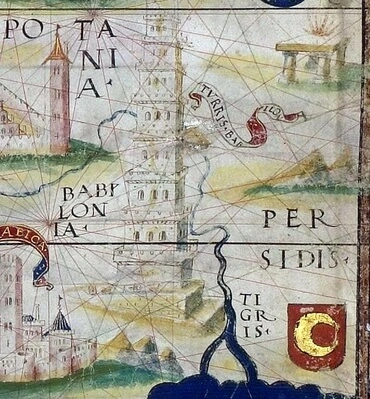Babylon (Babel)

Babylon was an ancient city built on the Euphrates river in what is now southern Iraq. It once was the capital of a great empire which at one point conquered the land of Judah as mentioned in the second book of Kings and in Daniel. But the river changed its course and the city was abandoned long ago. Both the historic city in Mesopotamia and the parable city with its tower, mentioned in Genesis, represent the same thing, a worship that appears holy in externals, while the internals are profane. This representation expands to mean a church whose leaders use this kind of worship to gain dominion over others for their own gain and for the gain and power of the church. The city itself is the doctrinal structure that supports this kind of worship and dominion.
(References: Apocalypse Explained 1029; Arcana Coelestia 1283, 1302, 1304, 1310, 1311)
Woman


The word "woman" is used a number of different ways in the Bible – as a simple description, as someone connected to a man ("his woman"), as a temptation to the men of Israel (women of other nations) and even as a term of address (Jesus addresses Mary as "woman" twice). There are also various spiritual meanings, and context is important. In most cases, a "woman" in the Bible represents a church, either a true one following the Lord or a false one out to deceive. This follows from the idea that the true character of an organization – or of an individual person – is determined by its goals, its mission, what it cares about most. This is well represented by women, because women are, at their inmost levels, forms of affection and love. Men, by contrast, are forms of thought and intellect, which appear prominent but actually play the secondary role of describing and supporting the defining loves and affections. The most central of a woman's loves and affections is the love of truth. On an individual scale this is central to the union between a wife and a husband: She loves his intellect and ideas, and blends them with her own to produce acts of love and kindness; meanwhile her love inspires him to seek more true ideas and greater wisdom so those acts of love and kindness can be ever better. The relationship between the church and the Lord is different, obviously, because the Lord is perfect love and perfect wisdom in balance, and is ultimately both masculine and feminine. The church is also not specifically feminine, being made up of men and women working in harmony. Even so, the defining aspect of a church is its love for truth, and how it receives ideas from the Lord. So while "woman" sometimes represents a church in general, it can also represents the love of truth that exists in that church, or the love of truth itself. Not all churches are true, of course. The reason the people of Israel were so strongly forbidden to intermarry with the people that surrounded them was that the foreign women represented false churches and false beliefs. And for an Israeli woman to take a foreign husband represented introducing falsity into the Israeli church. Two other uses of "woman" are more limited, primarily to the Book of Genesis. One of them is Eve, the first woman, formed from the rib of Adam. In that story Adam represents the Most Ancient Church, and the woman represents what the Writings call the "proprium," a sense of self, of identity, of control that the Lord gave to people of the church at that time. In a way this fits with the more general representation, because the love of truth is an important way we can feel a sense of power in our own spiritual growth, but the representation of Eve is relatively unique. Much of the rest of Genesis is dealing rather directly with the Lord's own development during his childhood on earth. Since the Lord thought and felt more deeply than we can possibly imagine, the women in this stories – Sarah, Rebecca, Leah, Rachel and others – represent true ideas themselves, rather than affections for truth.






